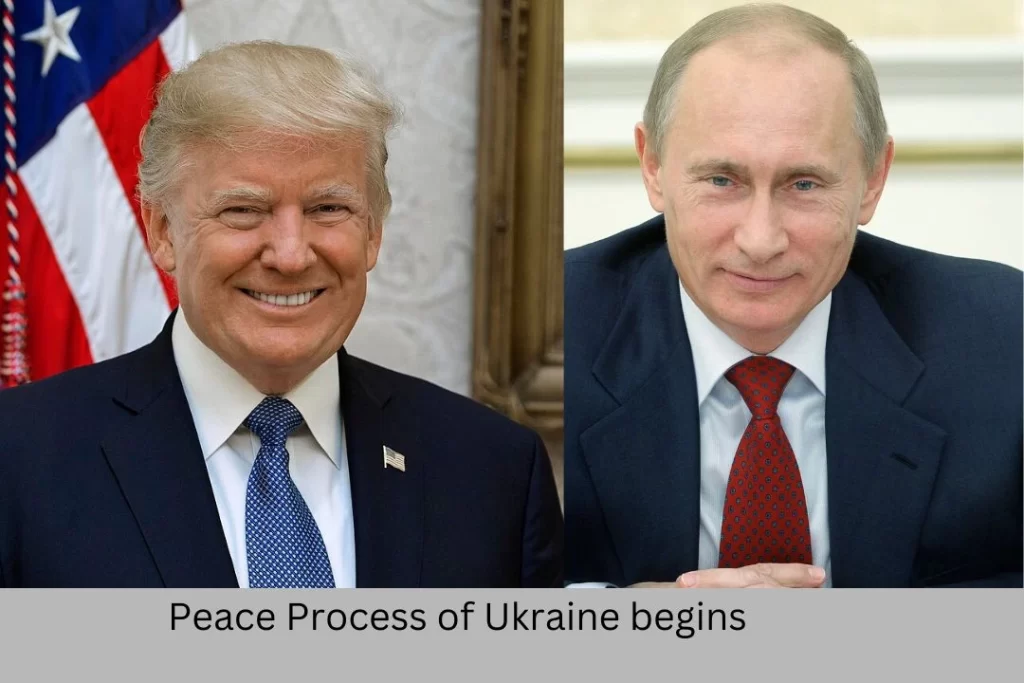In a major diplomatic initiative, U.S. President Donald Trump and Russian President Vladimir Putin have agreed to commence negotiations aimed at bringing an end to the ongoing Ukraine war. During a phone call on Wednesday, both leaders emphasized their willingness to “work together closely” to facilitate peace.
“We acknowledged the strengths of our respective nations and the potential for future collaboration,” Trump disclosed in a social media post. “But first, we must stop the tragic loss of lives in the Russia-Ukraine conflict.”
The U.S. president confirmed that negotiation teams would be deployed immediately and indicated that Ukrainian President Volodymyr Zelenskyy would be informed of the discussions. However, White House officials refrained from specifying whether Ukraine would be directly involved in the initial stages of talks.
The diplomatic breakthrough followed a high-profile prisoner swap between the U.S. and Russia. Moscow released American schoolteacher Marc Fogel, who had been detained on drug charges for over three years. In exchange, Alexander Vinnik, a Russian convicted of financial crimes, was repatriated.
Vinnik was initially arrested in Greece in 2017 at the U.S.’s request over cryptocurrency fraud allegations. He later pleaded guilty in a U.S. court to conspiracy charges and had been awaiting extradition back to Russia. The Kremlin confirmed that a Russian citizen had been freed in exchange for Fogel, though details remain undisclosed.
Trump welcomed Fogel back to the U.S. on Tuesday, meeting him personally at the White House upon his return. The White House characterized the move as a “diplomatic thaw” that could serve as a foundation for broader negotiations concerning Ukraine.
The Kremlin announced that President Putin extended an invitation for Trump to visit Moscow for in-person discussions regarding the Ukraine settlement. The Russian leader emphasized the importance of direct diplomatic engagement and signalled his willingness to host American officials for further negotiations on matters of mutual interest.
While the White House has yet to confirm a scheduled meeting between the two leaders, diplomatic circles anticipate further progress in negotiations in the coming months. This marks the first significant engagement between the U.S. and Russian presidents since February 2022, when Putin had last spoken with then-U.S. President Joe Biden.
Trump, a self-proclaimed master negotiator and author of The Art of the Deal, reiterated his commitment to ending the war in Ukraine. Speaking at the White House on Tuesday, he suggested that the recent diplomatic overtures could pave the way for a broader peace agreement.
“We were treated very well by Russia in this matter,” Trump stated, referring to Fogel’s release. “Hopefully, this marks the beginning of a new relationship—one that will ultimately help us end this war.”
The Kremlin remained more reserved in its optimism but acknowledged that the prisoner swap had contributed to an atmosphere of trust.
While concrete details regarding the proposed peace negotiations remain sparse, both Washington and Moscow appear to be laying the groundwork for further diplomatic engagements aimed at de-escalating one of the most volatile conflicts in recent history.
Observers remain cautiously optimistic about the potential for a diplomatic resolution to the Ukraine war. However, uncertainty persists regarding Ukraine’s role in these U.S.-Russia negotiations. Zelenskyy’s administration has yet to issue an official response to Trump and Putin’s initiative.
With global leaders closely watching these developments, the coming weeks will be crucial in determining whether this renewed dialogue translates into a meaningful peace process or merely another phase in the ongoing geopolitical standoff





